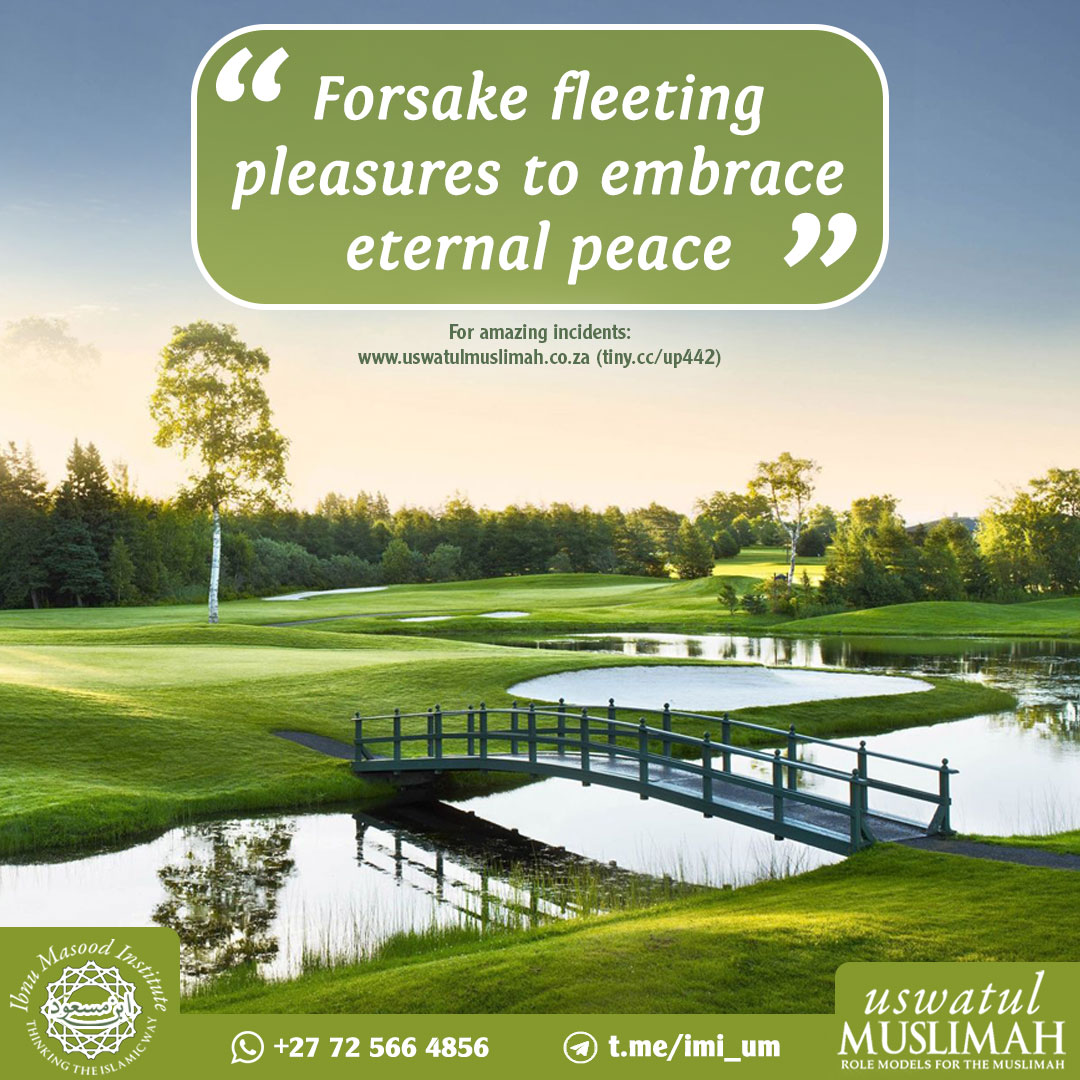(Sayyiduna Abu Zarr [radhiyallahu ‘anhu] – Part Three)
On one occasion, Rasulullah (sallallahu ‘alaihi wasallam) mentioned, “In my Ummah, Abu Zarr possesses the zuhd (asceticism) of ‘Eesa (‘alaihis salaam).” According to another narration, he (sallallahu ‘alaihi wasallam) said, “Whosoever wishes to see the ascetism of ‘Eesa (‘alaihis salaam) should look at Abu Zarr.”
Every aspect of the life of Sayyiduna Abu Zarr (radhiyallahu ‘anhu) bore testimony to this statement of Rasulullah (sallallahu ‘alaihi wasallam). On one occasion Sayyiduna Abu Zarr (radhiyallahu ‘anhu) explained that during the time of Rasulullah (sallallahu ‘alaihi wasallam), his food consisted of just one saa’ (a unit of measurement) of dates. He added, “I will not increase (that amount) until I meet Allah Ta‘ala.”
‘Ataa bin Abi Marwaan (rahimahullah) once saw Sayyiduna Abu Zarr (radhiyallahu ‘anhu) performing salaah in a single striped cloth. He asked, “O Abu Zarr, do you not have any other clothes besides this?” Sayyiduna Abu Zarr (radhiyallahu ‘anhu) replied, “If I had (any other clothes), you would have seen me wearing it.” ‘Ataa (rahimahullah) then said, “Indeed I had seen two pieces of cloth on you for a few days.” Sayyiduna Abu Zarr (radhiyallahu ‘anhu) replied, “O my nephew, I had given it to someone more in need than me.” Abu Marwaan (rahimahullah) remarked, “By Allah, you yourself were in need of both pieces!” Sayyiduna Abu Zarr (radhiyallahu ‘anhu) responded, “O Allah, forgive (us). You are giving importance to this world! Do you not see this shawl upon me? Along with it, I have another shawl for the masjid. I also have goats which I milk, and a few donkeys upon which I carry my provisions. (Moreover,) we have people who serve us and prepare our food. What bounty could be greater than what we (already) enjoy?”
On another occasion, a man came to offer something to Sayyiduna Abu Zarr (radhiyallahu ‘anhu), but he refused. He then enumerated the blessings Allah Ta‘ala had already given him and said, “I fear that I will be held accountable for excess possessions.”
A man who used to perform salaah with Sayyiduna Abu Zarr (radhiyallahu ‘anhu) in Baytul Maqdis related that his shawl was worth more than all the other possessions in his home combined. Maimoon bin Mihraan (rahimahullah) added that all the possessions in the house of Sayyiduna Abu Zarr (radhiyallahu ‘anhu) were worth less than two silver coins.
Once, someone suggested to him, “Why do you not acquire a property (land/estate) as so-and-so has done?” He replied, “What would I do with being a master? Indeed, what suffices me each day is a drink of water or milk, and for the week a qafeez (a unit of measure) of wheat.”
It is also reported that once his wife reproached him about their (extremely simple) lifestyle. He responded, “O Ummu Zarr, ahead of us lies a steep and difficult ascent, and the one who is light (of worldly burden) will find it easier to cross than the one who is heavy.”
Once Rasulullah (sallallahu ‘alaihi wasallam) asked the Sahaabah (radhiyallahu ‘anhum), “Which one of you will meet me (on the day of Qiyaamah) in the same condition in which I left him?” Sayyiduna Abu Zarr (radhiyallahu ‘anhu) replied that he would be the one. Rasulullah (sallallahu ‘alaihi wasallam) affirmed his statement saying, “You have spoken the truth.”
The nephew of Sayyiduna Abu Zarr (radhiyallahu ‘anhu) was once asked, “What (possessions) did Abu Zarr (radhiyallahu ‘anhu) leave behind (after his demise). He replied, “He left behind two female donkeys, a male donkey, some goats and a few riding animals.
(Tabaqaat Ibni Sa’d vol. 4, pg. 228, 230, 231 & 235, Al-Istee‘aab vol. 1, pg. 323, Usdul Ghaabah vol. 4, pg. 437 and Az-Zuhd lil Imaam Ahmad #800 & 802)
Lessons:
1. The purpose of a comparison is to highlight and distinguish the qualities of a person or thing. The value and weight of any comparison depend on what or whom is being used as the standard. What could be greater than being likened to a prophet of Allah Ta‘ala? Likewise, the credibility of a comparison depends on the one making it — and who could be more credible and truthful than Rasulullah (sallallahu ‘alaihi wasallam)? Sayyiduna Abu Zarr’s (radhiyallahu ‘anhu) disinterest in the world was of such a high level that he was likened to Nabi ‘Eesa (‘alaihis salaam) in this aspect by none other than Rasulullah (sallallahu ‘alaihi wasallam).
2. When one reflects on the fleeting nature of this world and the everlasting Hereafter, he realises that the temporary luxuries and comforts of this life are insignificant compared to the eternal bliss of the Hereafter. When a person has firm conviction of the Hereafter in his heart, he will, in all the decisions of his life, choose to forgo the temporary pleasures of this world and aspire solely for the everlasting pleasures of the Hereafter. Sayyiduna Abu Zarr (radhiyallahu ‘anhu) possessed such a desire and conviction for the Hereafter that he attached little to no importance to the comforts of this world, making the Aakhirah the ultimate goal of his life. Hence, it is vital for us, especially in today’s era of materialism and secularism, to keep the Aakhirah constantly before our eyes. When the nature of this temporary world and the reality of the everlasting Hereafter settle firmly in our hearts, it becomes easier for us to worship Allah Ta‘ala and live our lives in His obedience.

